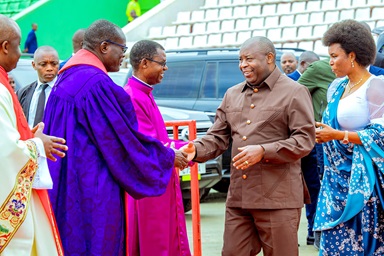Key points:
• Moheto First United Methodist Church extends training opportunities and offers seed funding to farmers.
• To become sustainable, the church grows maize and beans, which are in high demand.
• Each participating farmer is expected to plant a demonstration plot on their farms, where they practice what they have learned.
Moheto First United Methodist Church in Kenya’s Migori County is helping lift people out of poverty in its rural community by training them to farm in tough conditions.
Participants learn new farming techniques, receive quality seeds and are offered extension services through the church program, which began in 2019 after flooding and drought destroyed crops.
The region previously had long and short rain seasons, and farmers knew the best times to plant. However, in recent years, the region received abnormally more rain within short time periods, flooding fields and destroying crops. The rains often were followed by long dry seasons, which led to crop failure and subsequent hunger.
Responding to the situation, Moheto First United Methodist Church started a project to grow maize and beans. They recruited members to take part. Initially, 42 members were involved. The following season, a partnership was initiated between the church and Kenya’s Pannar Seed Company, which trains farmers in improved farming methods and gives them certified seed.
Ann Craig, a member of New Paltz United Methodist Church in the New York Conference, initiated a funding campaign in 2020. Proceeds were used to buy fertilizer, certified maize seed and beans. After funding, the project engaged 88 church and community members.
“After three years of implementing these farming practices, an estimated 125 farmers have been trained in better farming techniques that have led to increased crop yields and improved quality of life for their 750 family members,” said Husen Chacha, project supervisor. “In addition, trained farmers have taught their neighbors these new farming methods, benefiting another 750 people.”
The church strengthens socioeconomic well-being by promoting community participation and ownership of the development process and organizing with the goal of sustainability.
“I was known as a farmer without skills,” Chacha recalled, “but today, I can provide more food for my family, and I am happy to be called a farmer. I can meet my family’s basic needs and still make some little profit for my farm produce.
“Thanks to Pannar Seed Company,” he added, “I was able to grow maize after receiving seeds and fertilizer. I gathered much more than previously and invested in a basic dryer, allowing me to store and sell it to earn money. This assistance tremendously aided me and my family in producing adequate food for the household. I can now pay my children’s school tuition and supplies by selling the excess food.
“Together, we farm for the future,” Chacha said.
Agronomist Thomas Otato noted that a five-acre demonstration farm was set up near the church to teach traditional and conservation farming methods. “At the end of the training,” he said, “these farmers embark on fieldwork for four months under the guidance and supervision of Pannar Seed Company extension workers.”
Each participating farmer is expected to plant a demonstration plot on their farms, where they practice what they have learned. “At the end of each quarter,” Otato said, “up to 15 farmers complete the training in improved farming methods and increase their food security and standard of living for their families.”
“We have successfully increased our harvests, directly due to the skills we’ve learned from the Moheto farming project,” said local farmer Rael Gati. “The government has been unable to support our agricultural efforts as farmers,” she said. “When the church came along to offer this training and follow-up support, we were thrilled.”
Thomas Matiko, a large-scale farmer, said he likes what the First United Methodist Church Moheto farming project does for communities.
“Training people in a rural area, especially in farming methods, is lifting them out of poverty,” Matiko said. “In the past, Kenyans used to depend on rainfall to farm, but in areas like Moheto, which are affected by droughts, it is safer to use other methods of farming.”
The Rev. Kennedy Mwita, senior pastor at Moheto First United Methodist Church, said farmers need to diversify their farming practices, including the crops they plant.
“There was need to plant drought-resistant crops and experiment with other methods such as irrigation,” Mwita said. “This project might be the only way that people in this community can improve food security and raise their standard of living.”
Mwita has more than 23 years of experience supervising and training farmers, especially small-scale farmers in Migori County, giving him the ability to work with large groups of farmers.
“With high poverty levels, especially in rural Kenya,” Mwita said, “there is a great need to reach out to people with alternative methods of improving their lives. This project provides a sustainable solution to food insecurity. Farmers are now able to use drought-resistant seeds, bred for yield stability, that suit the environment.”
Moheto First hires equipment for the demonstration farm. The project takes place in remote Kenya, and the hired truck transports crops and delivers produce to local markets.
To become sustainable, the church grows maize and beans, which are in high demand.
“Going forward,” Mwita said, “the church is seeking funds to purchase a 10-horsepower tractor, a truck, a harrowing disc and a disc plow to revamp and diversify the ongoing training of local smallholder farmers.
“Pray for the people of Kenya,” he continued. “God is our shelter and strength, always ready to help in times of trouble.”
Maiga is a communicator for the Kenya-Ethiopia Conference.
News media contact: Julie Dwyer at [email protected]. To read more United Methodist news, subscribe to the free Daily and Friday Digest.
Like what you're reading? Support the ministry of UM News! Your support ensures the latest denominational news, dynamic stories and informative articles will continue to connect our global community. Make a tax-deductible donation at ResourceUMC.org/GiveUMCom.




